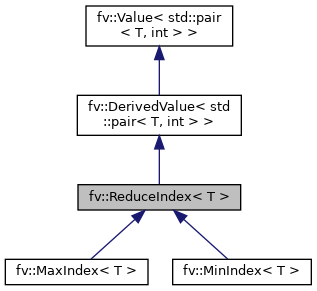Similar to Reduce, but returns a pair of a T and an int. More...
#include <value.hpp>
Inheritance diagram for fv::ReduceIndex< T >:

Collaboration diagram for fv::ReduceIndex< T >:

Public Member Functions | |
| ReduceIndex (Function< std::pair< T, int >(std::vector< T >)> &reduce, Value< std::vector< T > > *v, const std::string alias="") | |
 Public Member Functions inherited from fv::DerivedValue< std::pair< T, int > > Public Member Functions inherited from fv::DerivedValue< std::pair< T, int > > | |
| DerivedValue (const std::string &name, const std::string &alias="") | |
| std::pair< T, int > & | get_value () |
| Calculate, if necessary, and return the value held by this object. | |
 Public Member Functions inherited from fv::Value< std::pair< T, int > > Public Member Functions inherited from fv::Value< std::pair< T, int > > | |
| Value (const std::string &name, const std::string &alias="") | |
Private Member Functions | |
| void | update_value () |
| Updates the internal value. More... | |
Private Attributes | |
| Function< std::pair< T, int >std::vector< T >)> & | reduce |
| Value< std::vector< T > > * | v |
Additional Inherited Members | |
 Protected Attributes inherited from fv::DerivedValue< std::pair< T, int > > Protected Attributes inherited from fv::DerivedValue< std::pair< T, int > > | |
| std::pair< T, int > | value |
| bool | value_valid |
Detailed Description
template<typename T>
class fv::ReduceIndex< T >
Similar to Reduce, but returns a pair of a T and an int.
This is useful if you need to know where in the vector exists the element being returned.
Member Function Documentation
◆ update_value()
template<typename T >
|
inlineprivatevirtual |
Updates the internal value.
This function should be overridden by any child class to do the actual work of updating value based on whatever rules the class chooses. Normally, this consists of geting the values from some associated Value objects, doing some calculation on them, and storing the result in value.
Implements fv::DerivedValue< std::pair< T, int > >.
The documentation for this class was generated from the following file:
- /home/caleb/Sources/TTTT/filval/value.hpp
 1.8.13
1.8.13